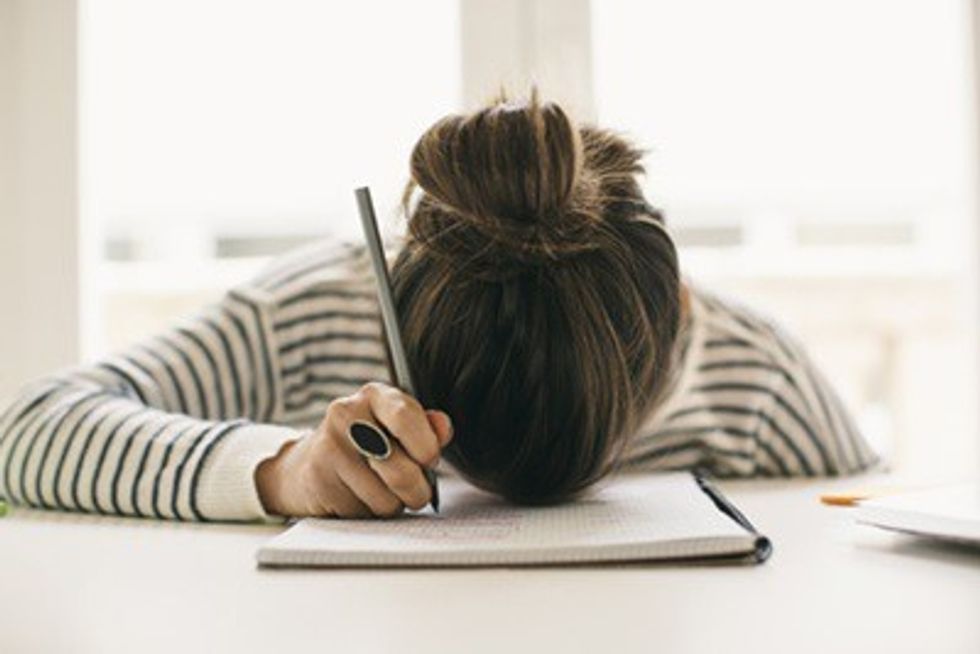So you have the feeling of wanting to write and you're poised at your keyboard or over your notebook, but suddenly you blank and don't know what to write or how to begin. What do you do?
1. Organize Your Thoughts.
Often times, we feel the urge to write but we don't know where to start because we have so many different ideas running through our minds. Putting your thoughts down on paper helps you get those ideas out and make them more definite. Mind mapping helps if you have ideas for different genres. Personally, when I find myself with too many ideas, I bullet point the different ideas I have and write descriptions of scenes I think of in my head. Describing the scene helps me figure out if it's one that I can base a plot off of. If I can't, then I'll probably throw out the idea or save it for later when I feel like developing the scene. Pick one that grabs your attention the most or one that seems the less daunting and go from there.
2. First Draft ≠ Final Draft
Just because you write something down, doesn't automatically mean it's set in stone. In fact, it's quite the opposite. It should be a regular occurrence for you to make multiple drafts. I once wrote four different versions of the same chapter because I couldn't figure out how to segue into the next part of the story. The first thing you write down should never be the final draft. The first draft is important for the purpose of getting your main idea out, not to make everything perfect. You should always go back and edit where you can to improve your writing.
3. Don't Type, Write
I don't know how others may feel about this, but I find that handwriting my thoughts/scene helps me write. There's something about using pen and paper that makes me feel more casual and at ease, so I'm more likely to write something down. Plus, it's a good opportunity to practice your handwriting if you're someone who writes with hieroglyphics. I may feel this way because I am a kinesthetic learner. For auditory learners, you might find it useful to record yourself talking out your ideas and if you're more visual, drawing the scene you have in your mind might help you better than the first two methods. Find what works for you and use it!
4. Try a New Writing Style
If you find yourself writing the same way, take this time to write differently. This can mean changing the point of view or going towards a new genre. If you feel more comfortable writing a first person romance, try a third person horror story for a change. Not only can this help you gain more skills in your writing, but it can also open up new ideas. If you can't seem to think of a new romance trope that hasn't been written about, write in a different genre. Changing the point of view is also more crucial than you think. Getting stuck using the first person limits you a lot creatively and limits the number of things you can write about. The third person can help you practice using more detail by writing from more than one character's perspective.
5. Look for Inspiration
If you're having the kind of writer's block where you just have no idea, then looking at other mediums (books, tv, nature, etc) can help you find inspiration. You'd be surprised at how the simplest things you see or think about can be turned into a full plot and story. I find that writing prompts help as well as quotes. There have been many times where I've been watching TV, heard a character say something, and then let my mind wander to develop that quote into a story. Sometimes it doesn't work, but I've gotten a lot of gem ideas from them. It's important though to remember not to copy exactly from what you read or see which is easier said than done. Changing a few aspects of what you experience can make the story your own and make the story a unique read.
6. Don't Force it
Lastly, if you're sitting there, racking your brain for a semblance of an idea, and still nothing comes up, then it's best to just get up and leave. Forcing an idea to come to mind is often more counterproductive than not bothering to try and write in the first place. Overworking yourself only irritates you and makes you less likely to produce something good. Taking a break, anywhere between fifteen minutes and a few days, is probably better for you if you find yourself stuck no matter what you try. Writing should be a fun experience that proves to be a stress reliever for you, not a chore. What you write should be something you like and not something you created just because you felt that you were supposed to write it. Taking suggestions from friends about what you should write can also be a bad idea for the same reason. If you're not excited to write what they want, then it won't come out as good as a story you think of on your own. Writing is different for everyone and should be treated as such. You should never feel pressured to write/not write a certain thing for any reason. If the idea strikes you, try it!

















